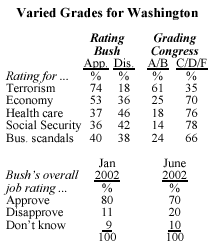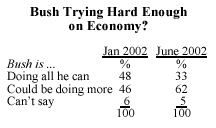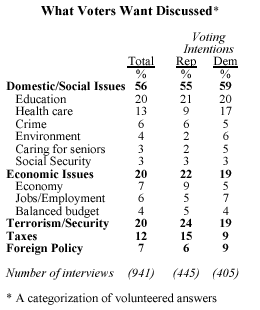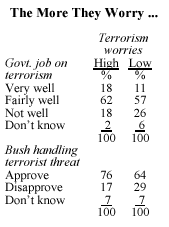Introduction and Summary

The upcoming congressional election may be as much a referendum on domestic concerns as on the war on terrorism, as the public’s economic anxiety increases and its frustration with Washington mounts. Voters say that domestic matters such as health care, education and the economy come up in conversation as frequently as the war on terrorism. And while President Bush’s overall approval ratings remain quite strong, just one-in-three say the president is doing all he can to improve the economy. Congress is also judged harshly by the public for its record on domestic issues.
Continued strong support for the president’s handling of the fight against terrorism has kept his overall grades high and is preventing domestic discontent from costing his party support. However, when voters consider the subjects they want their local candidates to debate, terrorism is not so dominant that it crowds out interest in other issues.
In the latest nationwide Pew Research Center survey of 1,212 adults (941 registered voters), conducted June 19-23, one-in-five voters volunteered that they wanted their candidates to talk about terrorism and national security, but both economic issues and education were cited just as often, and 13% mentioned health care. Notably, many more voters want to hear about health care than in a comparable survey four years ago.

The public’s competing concerns are reflected in their disparate evaluations of the president and his handling of various issues. While 70% approve of Bush’s overall job performance, his rating is much lower on domestic issues — very low in some cases. For instance, Bush gets a 37% approval score for his handling of health care, 36% on Social Security, 41% for energy policy and 45% for tax policy. The president’s approval rating for handling the economy has slipped from 60% in January to 53% in the current survey. To be sure, he fares well on other key domestic issues — notably education and the environment. But Bush’s strong suit by far continues to be the way he has handled terrorism and other international issues, including the troubled Mideast situation for which he gets a 64% approval score.
Despite official statistics pointing to an economic recovery, the new poll finds rising worries about the availability of jobs; indeed, that is emerging as a central concern even for the upper-middle- class and suburbanites. Just 31% of Americans say there are plenty of jobs available in their community, down from 42% a year ago. Americans also continue to express high levels of economic anxiety, particularly with regard to meeting the financial commitments of health care and retirement. This may reflect the public’s uncertainty about the strength of the recovery. In January, a solid plurality of respondents (44%) said they expected the economy to pick up over the coming year, although they offered a mixed view of their current financial condition. But in the current survey, far fewer (30%) see the national economy improving over the next 12 months.
This sense of unease is reflected in the sharp drop in the number who say Bush is doing all he can to jump-start the economy. Just a third say he is doing all he can to improve economic conditions — down from 48% in January. It also is seen in the public’s poor grades for Congress’s handling of top domestic issues. Terrorism is the only issue for which a majority (61%) gives Congress a good grade. Just a quarter say Congress deserves a grade of “A” or “B” for the economy, and even fewer (18%) give lawmakers favorable marks for health care.

The disconnect between public satisfaction with the administration (and to a lesser degree, Congress) on the war on terrorism and frustration with progress on the domestic agenda has only reinforced the partisan parity that has defined recent elections. As in previous surveys, about as many registered voters say they intend to vote for a Republican candidate (44%) in the congressional elections as say they plan to back a Democrat (46%).
Despite the extraordinary circumstances surrounding this election, there is no indication that it is being viewed much differently than previous mid-term elections. Only about one-in-four think that national issues will be decisive in their vote — as in the past, the candidates’ personal strengths and weaknesses and local issues are bigger factors. Potential Democratic voters want to hear more from the candidates about health care, while those intending to back GOP candidates want terrorism and taxes discussed.
As was the case in 2000 and 1998, the potential electorate is about evenly divided over whether party control of Congress will be a factor in their vote. Democrats are expressing slightly more concern about who controls Congress than they were four years ago when Bill Clinton sat in the Oval Office. Roughly six-in-ten Democrats say party control will be a factor in their voting decision, compared with half of Republicans and 28% of independents.

The survey, conducted in the wake of the arrest of American Jose Padilla for allegedly planning a “dirty bomb”attack, finds growing fears of a new terrorist strike and slumping ratings for government efforts to prevent terrorism. Increased worries about another attack are most evident in the Northeast, where concern is considerably higher than in the rest of the country. But these growing concerns are not causing political problems for the administration or Congress. The more Americans worry about terrorism, the more positive is their opinion of efforts by the president and Congress to combat it.
The public is still paying close attention to news about terrorism and sees the debate about the issue becoming more partisan: 58% think Washington leaders have begun to argue along party lines about ways to combat terrorism. Democrats get somewhat more blame for this than Republicans.
Americans are increasingly conflicted in trying to reconcile the goal of preventing another attack with the desire to protect civil liberties. Since the fall there has been a decline in the number of people who think that civil liberties will have to be sacrificed in the struggle against terrorism, and rising concern that new anti-terrorism laws will excessively restrict personal freedom. Despite these trends, there is broad support for holding U.S. citizens suspected of terrorism without formal charges — even though many worry that this policy could ultimately undermine traditional legal protections.